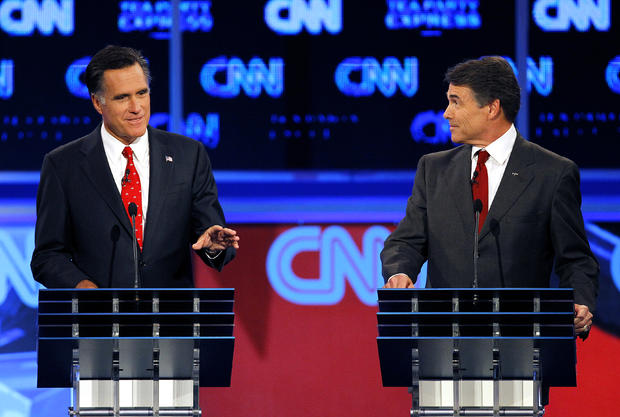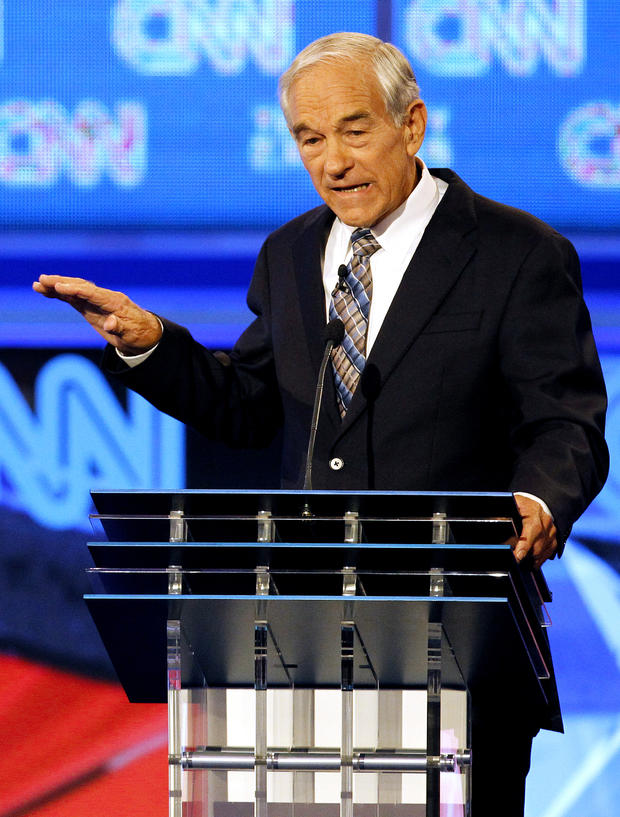Tea Party audience gets into the GOP debate
The eight GOP candidates for the presidential nomination played to a friendly and sometimes boisterous crowd of fans Monday night. The Tea Party Express and more than 100 state and local Tea Party groups around the country sponsored the debate, which aired on CNN.
Unlike most election season debates, in which the mainstream media hosts request that the live audience refrain from excessive expressiveness, the Tea Party debate audience didn't hold back. It was more like a Tea Party town hall.
One of the biggest cheers when former Speaker Gingrich slammed President Obama, "I'm not particularly worried about Governor Perry and Governor Romney frightening the American people when President Obama scares them every single day."
The most controversial audience response came during an exchange between Texas Congressman Ron Paul and CNN host Wolf Blitzer, who posed the following hypothetical question:
"A healthy 30-year-old young man has a good job, makes a good living, but decides, you know what? I'm not going to spend $200 or $300 a month for health insurance because I'm healthy, I don't need it. But something terrible happens, all of a sudden he needs it. Who's going to pay if he goes into a coma, for example? Who pays for that?," Blitzer asked.
Following is the exchange:
Paul: Well, in a society that you accept welfarism and socialism, he expects the government to take care of him.
Blitzer: Well, what do you want?
Paul: But what he should do is whatever he wants to do, and assume responsibility for himself. My advice to him would have a major medical policy, but not be forced --
Blitzer: But he doesn't have that. He doesn't have it, and he needs intensive care for six months. Who pays?
Paul: That's what freedom is all about, taking your own risks. This whole idea that you have to prepare and take care of everybody --
Blitzer: But Congressman, are you saying that society should just let him die?
At that point some in the crowd voiced a resounding "yes" in response to the question. Paul went on to say, "...we've given up on this whole concept that we might take care of ourselves and assume responsibility for ourselves. Our neighbors, our friends, our churches would do it. This whole idea, that's the reason the cost is so high."
Paul was booed by many in the crowd when the topic of his statement related to 9/11 (below), contending that U.S. occupation in foreign lands leads to more terrorism, came up.
"Though it is hard for many to believe, honest studies show that the real motivation behind the September 11 attacks and the vast majority of other instances of suicide terrorism is not that our enemies are bothered by our way of life. Neither is it our religion, or our wealth," he wrote.
"Rather, it is primarily occupation. If you were to imagine for a moment how you would feel if another country forcibly occupied the United States, had military bases and armed soldiers present in our hometowns, you might begin to understand why foreign occupation upsets people so much."
The mix cheers and jeers for the eight candidates indicate that the race for the GOP nomination has a long way to go, both among the Tea Party and the less conservative members of the Republican party.

